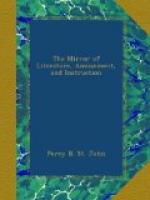I never shall forget his delight as we tranquilly glided to the side of the landing-place, nor his violent indignation when stepping out of the boat in a pair of jockey boots, and selecting, what appeared to his ruralized vision, a verdant spot; his feet slid from under him, and he got a fall unmodified in its disagreeable results by the excitement of the sport so prevalent in his native country.
“Who built this fine stone affair?” said R——, pointing to the pea-green promenade on our right.
“The people of Margate,” said some one.
“I thought nobody in England but the king could make a pier,” said R——.
“Come, come,” cried B——, “let us be grave for a minute or two; we look more like a parcel of boys landing than a grave and learned body.”
“Youth is the time for punning,” said R——.
“It is no great crime when one is older,” said B——.
“That I deny,” answered our wag; “it may be good in youth, but it is bad in age.”
The groan which followed this last pun of the voyage reechoed along the shore, and it was not until we reached Howe’s hotel, a sort of Bath York House stuck in the middle of Golden Square, London, that the tumult died away.
* * * * *
THE UNICORN.
In the physical world, some of our secrets are disappearing; and though Captain Parry failed to find out the pole, and we believe, with that worthy navigator, that the world have been dreaming from the beginning, and that there is no pole; and though Captain Ross will go further and fare worse, yet things are turning up now and then that our most benevolent scepticism cannot resist. But among other plunders of the imagination, they are going to rob us of the unicorn. For two thousand years and upwards, a short date in the history of human quarrel about nothings, the sages of this world have been doubting and deciding on the existence of this showy creature. Pliny would have sworn to his having all but seen it, and he would have sworn that too, if any one had taken the trouble to ask him. Kircher, and a few of the German naturalists, and black-letter fools—every naturalist and black-letter man being more or less a fool—dug up the question out of the pit of Teutonic dulness, and ever since, every traveller beyond the Needles, has had his theory, which was quite as good as his fact, and his fact, which was quite as good as his theory.
The topic perished in Germany, being stifled under professor Bopp and Sanscrit, Professor Semler and Scepticism, Professor Jahn and Jacobinism, and the whole vast feather-bed suffocation of Professor Kotzebue and Comedy. But in England it was endeared to us by associations “deep in every truly British heart,” as the chairmen of our tavern parties say over their third bottle. We had seen it for ages gallantly climbing the slippery heights of the




